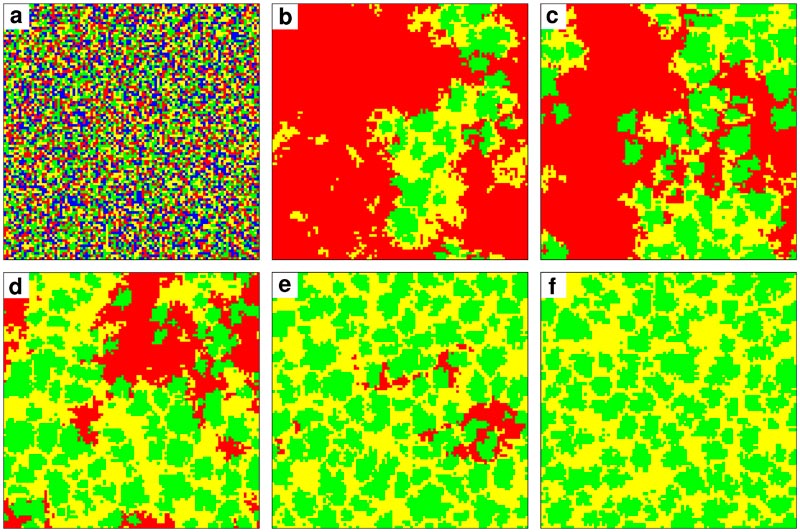|
|||||||
|
|
|
 |
|
|
Strumenti |
|
|
#1 |
|
Bannato
Iscritto dal: Aug 2001
Città: Berghem Haven
Messaggi: 13528
|
Articolo interessante sull'evoluzione della moralità
http://physicsworld.com/cws/article/news/42540
A statistical-physics-based model may shed light on the age-old question "how can morality take root in a world where everyone is out for themselves?" Computer simulations by an international team of scientists suggest that the answer lies in how people interact with their closest neighbours rather than with the population as a whole. Led by Dirk Helbing of ETH Zurich in Switzerland, the study also suggests that under certain conditions, dishonest behaviour of some individuals can actually improve the social fabric. Public goods such as environmental resources or social benefits are often depleted because self-interested individuals ignore the common good. Co-operative behaviour can be enforced via punishment but ultimately co-operators who punish will lose out to co-operators who don't punish because punishing requires time and effort. These non-punishing co-operators then lose out to the non co-operators, or free riders. With free riders dominant the resource is depleted, to the detriment of everyone – a scenario known as "tragedy of the commons". How, then, does co-operation arise? Some researchers have proposed that co-operators who punish could survive through "indirect reciprocity", the idea that working for the common good will enhance a person's reputation and ensure that they benefit in the future. Helbing's group, however, has shown that this is not needed for co-operation to flourish. Emergent phenomena They came to this conclusion by focusing on how individuals behave with their nearest neighbours, rather than a wider group that is representative of the entire population. Like nearest-neighbour models of magnetism – which are often more realistic than mean-field approximations – they say that this approach captures "emergent" phenomena that would otherwise be lost. Their game-theory-based model comprises a square lattice of tens of thousands of points, each representing an individual. Each individual could adopt one of four strategies – co-operate without punishing free riders; co-operate and punish ("moralist"); free ride; or free ride but also punish other free riders ("immoralist"). Initially, the four strategies are distributed randomly among individuals and the system evolves to find out which behaviour wins in the long run. This evolution is influenced by three variables – the fines that penalize free riders; the cost of administering punishment; and the "synergy factor", which stipulates how much the sum of individual contributions is enhanced by collective action. The computer program picks an individual at random and calculates how much it stands to gain relative to its four nearest neighbours, given the strategies employed by each neighbour. The exercise is then repeated for the neighbours themselves. The strategy employed by each individual was then modified in light of the success of their neighbours, so that individuals could imitate those who performed better than themselves. Intriguing results Running the simulation for up to 10 million iterations yielded some intriguing results. As expected, if the punishment fine to cost ratio and synergy factor were low then everyone would eventually become a free rider, just as moralists would prevail if the fine was set high enough. However, they also found that moralists could win out over non-punishing co-operators even if the cost of administering punishment was relatively high. This was because imitation of better-performing neighbours soon led to small clusters of both co-operators and moralists in a sea of free-riders. With moralists better than co-operators at dealing with free riders they came to dominate, even though they would lose out if placed in direct competition with the non-punishers. An "unholy collaboration" between moralists and immoralists was also seen whereby individuals adopting these strategies could coexist at the expense of both co-operators and free riders. This, the researchers found, would occur if the cost of punishment was low, the synergy not particularly high, and the fines moderately high. As they point out, this scenario is supported by the real-life existence of immoralists. New type of collective behaviour Helbing's colleague, Attila Szolnoki of the Institute for Technical Physics and Materials Science in Budapest sums up the work, "The contribution of statistical physics to this research field could be to realize that large numbers of players can result in a new type of collective behaviour that cannot be derived from two-player analyses. Computer models can therefore be considered as pre-experiments that help to design more sophisticated lab experiments." The team is currently building a laboratory capable of carrying out game-theory experiments with up to 36 people, which should allow them to test the predictions of their model. Herbert Gintis, an economist and game-theory expert at the Santa Fe Institute and Central European University in Budapest, believes that Helbing and colleagues are right to incorporate small-scale interactions into their model. But he says that they should also factor in genetic relations between people because individuals' behaviours depend on whether or not they are dealing with a close relative. About the author Edwin Cartlidge is a science writer based in Rome  Simulation showing how moralists and immoralists can coexist. (a) The simulation begins with a uniform distribution of co-operators (blue), free riders (red), moralists (green) and immoralists (yellow). The panels (b) to (f) show the time evolution from 250 iterations (b) to 12,000 iterations (f), when only moralists and immoralists remain. (Courtesy: PLoS Computational Biology) Fatto a casa nostra come vedete dall'ultima riga Aperto qui perchè penso interessi di più chi frequenta questa sezione. Ultima modifica di lowenz : 12-05-2010 alle 12:27. |
|
|

|
|
|
#2 |
|
Senior Member
Iscritto dal: May 2006
Città: Wursteland
Messaggi: 1749
|
In soldoni, se cambi casa assicurati prima che i vicini siano onesti.
__________________
Nintendo WIII 4d Turbo Intercooler - Sestium X 666 99,312 GHz - 6.984 Ram Σ(9999) MHz - HDD SATA 97e^(10) bytes 93³ rpm - ATI biberon X900z ∞Mb - Win Eight SP (1 > yours) 16 Valve |
|
|

|
|
|
#3 | |
|
Senior Member
Iscritto dal: May 2006
Città: Wursteland
Messaggi: 1749
|
Quote:
__________________
Nintendo WIII 4d Turbo Intercooler - Sestium X 666 99,312 GHz - 6.984 Ram Σ(9999) MHz - HDD SATA 97e^(10) bytes 93³ rpm - ATI biberon X900z ∞Mb - Win Eight SP (1 > yours) 16 Valve |
|
|
|

|
|
|
#4 | |
|
Bannato
Iscritto dal: Aug 2001
Città: Berghem Haven
Messaggi: 13528
|
Quote:
E' cmq un modello sensato e compatibile con la nostra esperienza. Da informatico la prima cosa che mi è venuta in mente (guardando le simulazioni di sopra, con i vari cluster che man mano si formano Ultima modifica di lowenz : 12-05-2010 alle 13:19. |
|
|
|

|
|
|
#5 | |
|
Senior Member
Iscritto dal: May 2006
Città: Wursteland
Messaggi: 1749
|
Quote:
Piccolo esempio: il modello mostra l'evoluzione della moralità in qualche secondo (immagino) massimo qualche ora, ma cerca di simulare un sistema reale nel quale gli elementi nei quali dovrebbe evolvere la moralità mutano, crescono, invecchiano. Sia ben chiaro che non sono esperto in materia, eh. Però do my 2 cents
__________________
Nintendo WIII 4d Turbo Intercooler - Sestium X 666 99,312 GHz - 6.984 Ram Σ(9999) MHz - HDD SATA 97e^(10) bytes 93³ rpm - ATI biberon X900z ∞Mb - Win Eight SP (1 > yours) 16 Valve |
|
|
|

|
|
|
#6 |
|
Senior Member
Iscritto dal: May 2002
Città: Pavia.. a volte Milano o Como...talora Buccinasco! Firenze fino al 15/7
Messaggi: 2143
|
questo IMHO è un esempio di scientismo.
Non si può studiare con metodi sicentifici fenomeni che non sono misurabili, neanche con metodi statistici. Figuriamoci fare modelli quantitativi. tra poco faranno un modello numerico che descriva l'andamento nel tempo dell'amore per la figa 
__________________
"Le masse sono abbagliate più facilmente da una grande bugia che da una piccola". (Adolf Hitler) "Se sei bello ti tirano le pietre, se sei brutto ti tirano le pietre. se sei al duomo ti tirano il duomo". (cit. un mio amico  ) )
|
|
|

|
|
|
#7 |
|
Senior Member
Iscritto dal: Jul 2008
Messaggi: 1021
|
Ma solo a me sembra molto strano che nel tempo spariscono i free riders e i co-operators (che sono estinti già alla 250esima iterazione)?
|
|
|

|
|
|
#8 | |
|
Bannato
Iscritto dal: Aug 2001
Città: Berghem Haven
Messaggi: 13528
|
Quote:
 Cmq trattasi di simulazioni legate alla teoria dei giochi più che di "metodo galileiano" applicato.....servono a "dare idee" come infatti è scritto: "The contribution of statistical physics to this research field could be to realize that large numbers of players can result in a new type of collective behaviour that cannot be derived from two-player analyses. Computer models can therefore be considered as pre-experiments that help to design more sophisticated lab experiments." Ultima modifica di lowenz : 12-05-2010 alle 13:58. |
|
|
|

|
|
|
#9 | |
|
Bannato
Iscritto dal: Aug 2001
Città: Berghem Haven
Messaggi: 13528
|
Quote:
 http://areeweb.polito.it/didattica/p.../Petrarca.html Ho sempre ammirato quest'uomo 
|
|
|
|

|
|
|
#10 | |
|
Senior Member
Iscritto dal: May 2006
Città: Wursteland
Messaggi: 1749
|
Quote:
__________________
Nintendo WIII 4d Turbo Intercooler - Sestium X 666 99,312 GHz - 6.984 Ram Σ(9999) MHz - HDD SATA 97e^(10) bytes 93³ rpm - ATI biberon X900z ∞Mb - Win Eight SP (1 > yours) 16 Valve |
|
|
|

|
|
|
#11 |
|
Bannato
Iscritto dal: Jan 2007
Città: Verona... finchè non mi buttano fuori :D
Messaggi: 3224
|
sono indeciso.
è più stronzo chi la ricerca l'ha fatta, chi gliel'ha approvata, chi gli ha dato tempo macchina per giocare a life o io che mi sono letto l'articolo almeno fino a metà? |
|
|

|
|
|
#12 | |
|
Senior Member
Iscritto dal: May 2002
Città: Pavia.. a volte Milano o Como...talora Buccinasco! Firenze fino al 15/7
Messaggi: 2143
|
Quote:

__________________
"Le masse sono abbagliate più facilmente da una grande bugia che da una piccola". (Adolf Hitler) "Se sei bello ti tirano le pietre, se sei brutto ti tirano le pietre. se sei al duomo ti tirano il duomo". (cit. un mio amico  ) )
|
|
|
|

|
|
|
#13 |
|
Member
Iscritto dal: Feb 2008
Città: dire paesino sarebbe essere generosi :asd:
Messaggi: 470
|
__________________
Sampdoria o Lazio,ditemi voi chi ha bruciato di piu,la sconfitta diretta o la sconfitta morale? |
|
|

|
|
|
#14 |
|
Bannato
Iscritto dal: Aug 2001
Città: Berghem Haven
Messaggi: 13528
|
A me sembrava interessante per tutti

|
|
|

|
|
|
#15 |
|
Senior Member
Iscritto dal: Apr 2006
Città: Bassano del Grappa
Messaggi: 10431
|
A me è parsa interessante, pur se poco utile per comprendere l'effettivo andamento della situazione nella realtà.
Ora mi leggo la tesi sull'amore del tizio.
__________________
"Non perdiamo di vista le vere priorità, l'economia serve a sostenere le vite, non devono essere le vite gli strumenti per sostenere l'economia." Conte Zero
Ipsa scientia potestas est |
|
|

|
|
|
#16 |
|
Bannato
Iscritto dal: Apr 2010
Messaggi: 8
|
direi un metodo per riciclare i programmi tipo Game of Life e simili
 http://en.wikipedia.org/wiki/Conway%27s_Game_of_Life c'è pure chi l'ha applicato alla politica 
|
|
|

|
|
|
#17 | ||
|
Bannato
Iscritto dal: Aug 2001
Città: Berghem Haven
Messaggi: 13528
|
Quote:
 Quote:
|
||
|
|

|
|
|
#18 |
|
Bannato
Iscritto dal: Jan 2007
Città: Verona... finchè non mi buttano fuori :D
Messaggi: 3224
|
è più simile a foxes and rabbits, a dire il vero...
|
|
|

|

|
| Strumenti | |
|
|
Tutti gli orari sono GMT +1. Ora sono le: 15:40.























